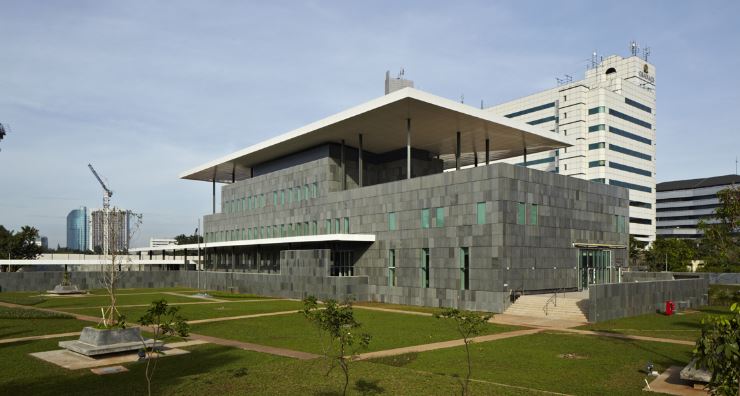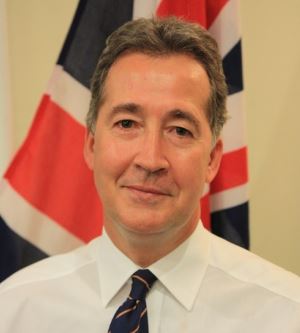Driving commercial and political engagement between Asia, the Middle East and Europe
Driving commercial and political engagement between Asia, the Middle East and Europe
Driving commercial and political engagement between Asia, the Middle East and Europe

The British Ambassador to Indonesia Mark Canning CMG speaks to Asia House about the Indonesian presidential elections which will take place on July 9, 2014.
Where does the campaign stand?
It’s a two-stage process and we are mid-way through. The legislative elections on 9 April, 2014 dictated which parties, individually or as a coalition, could nominate a candidate in the presidential election on 9 July, 2014.
That was followed by a frantic process of alliance-building and it’s come down to a head-to-head contest between the governor of Jakarta, Joko Widodo (popularly known as Jokowi) and the former special forces commander, Prabowo Subianto. Both have made experienced VP picks – Jokowi has teamed up with Jusuf Kalla, who occupied that role in the first Yudhoyono administration, and Prabowo with Hatta Rajasa, who has just stepped down from being the senior economics minister in the present government. The two candidates now sit at the head of broad coalitions.
How has it gone so far?
It’s been an impressive affirmation of Indonesia’s young democracy, not least at a time when democracy is coming under threat in so many other parts of the world, including this region. The vote in April, which involved 140 million voters and was the largest single day exercise of its kind in the world, went without a hitch.
Can you explain the role of president in Indonesia? Is it the equivalent of prime minister in the UK?
There are certainly similarities: while the president has considerable power, he must take account of the views of parliament, and of the parliamentary commissions which also wield significant influence. So there are checks and balances, and there is also the extent to which power in certain areas has been devolved to the regions.
My understanding is the public is voting for a candidate with a coalition party behind it. This was based on the April parliamentary elections. Can you explain a little bit how none of the parties passed the threshold for nomination, so formed coalitions to get the 20 per cent they needed. How many parties are in each candidate’s coalition?
The general expectation was that the Indonesian Democratic Party of Struggle (PDI-P), the party which was backing Jokowi, would pass the threshold but they fell just short, and the vote overall was fairly evenly spread, including among the Islamic parties. So two coalitions have now been formed – the one backing Jokowi comprises four parties, and Prabowo’s coalition consists of five parties.
The presidential incumbent, Susilo Bambang Yudhoyono, is constitutionally barred from seeking a third term in office. How has his tenure been viewed by the public and the West? What has been his key achievement? Is he popular?
One inevitably hears criticism that x or y hasn’t been done, and so on, and it’s hardly surprising in a nation that is so young, that challenges remain. But there’s a need in these things, as I point out to Indonesian friends, to take a longer perspective. Few people in 2004 – with the nation clawing its way back from political and economic chaos – could surely have imagined that just a decade later this would not only be the 16th largest economy, but a peaceful, stable and democratic nation. All of which is to say that he has played in my view a remarkable role in the evolution of Indonesia.
Can you comment on whether the Indonesian public is satisfied with Indonesia’s economic growth? Is there high unemployment? What are the key issues surrounding this election from their perspective?
Indonesia’s economic record in recent years has been pretty impressive, and despite recent cooling the economy is still forecast to grow at over five per cent next year. This growth has lifted a huge number of Indonesians out of poverty but a significant number, around 100 million, still live at or below the poverty line. So many would argue – as are both candidates – that this is a country that needs to be growing at seven to eight per cent plus to generate the jobs that are required. From a foreign investor viewpoint, we hope to see an economy that is open, a regulatory framework that is predictable and transparent, and which creates the right conditions to attract FDI.
How do the proposed foreign policies of the two candidates differ? What kind of foreign policies would the UK government like to see introduced? What view does either candidate have of Indonesia’s role in ASEAN.
I would imagine that the focus of whoever wins will be heavily on domestic challenges initially, as is the case in most nations. But equally I think that we will see broad continuity in foreign policy whoever comes out on top. Indonesia under President Yudhoyono has played an increasingly constructive role within and beyond the region – giving momentum to ASEAN’s development, projecting its democratic values and playing a really helpful role on issues like climate change. The region, and the wider international scene, needs an Indonesia that is active and engaged and acts as a role model within the Islamic world and beyond, and that I believe will continue.
Who will win?
Difficult to say, not least because the polling data has varied a lot. The pundits have always viewed Jokowi as the strong favourite, but the broad picture suggests the result could be close.
What’s at stake ?
A great deal. Indonesia is Southeast Asia’s biggest economy, and the world’s fourth most-populous nation.
Indonesia has come an amazing distance since the turn of the decade – from dictatorship and bankruptcy to become the third largest democracy and a member of the G20. It’s done great things in terms of lifting people out of poverty, becoming a moderate and successful nation, and spreading those values. It’s a story that is surprisingly little known, yet Indonesia now comprises over 40 per cent of regional GDP and is a cornerstone of the ASEAN economy. It’s difficult to envisage a successful and prosperous Southeast Asia without a successful and prosperous Indonesia; its progress since 1998 has played an important role in the story of the region.
So Indonesia is a country that really matters. But there are equally challenges that will need to be gripped if it is going to kick on to even greater things. Since 2008 it has fared much better than most of its peers economically, but there’s no doubt that the early decisions facing the incoming government in October will have a major bearing on where the nation goes in coming decades.
There seems to have been an increasingly nationalistic tone to some of the campaigning – should investors be worried?
The campaign has tended to focus more on the personalities of the contenders, and their policy platforms have had comparatively little airtime, although that may change with a series of debates approaching. But whichever government takes office, it will be confronted with the same array of challenges and I’m struck by the broad consensus on what those are – infrastructure bottlenecks need to be eased; there’s a need to reduce energy subsides in some way; they will want to ensure the education system and things like energy policy deliver what the nation requires. Both I believe will understand the importance of maintaining investment and capital flows, and the contribution which value-adding FDI can make to the development of the nation. So we need to examine actions not words, but I’m optimistic.
How does the UK fit into all this?
We’ve been focusing strongly on developing our relationship with Indonesia. We’ve been working closely with President Yudhoyono’s government in a range of important areas like development, open government, combating challenges like extremism and deforestation. Our education links have been growing really fast – 22 partnerships between our universities in the past year alone – and collaborating in new areas like research. Indonesia has become an important market for UK companies and it’s not difficult to see why – it’s already the 16th largest economy, with a fast-growing middle class of 40 million plus and a market which, if you get it right, can deliver returns seen in few other places. So Britain is a major investor in a range of sectors. Trade has been growing well, particularly in areas which leverage the tastes and needs of that middle class, and we are hoping in coming years to see more Indonesian investment come in this direction.
So the position of the new government on investment, continuing the work that has been done to combat corruption and on things like regulatory reform, will be really important but I’m confident that, whichever choice is made by the voters, the relationship between our two countries will continue to develop as it has done in recent years.

Mark Canning CMG, British Ambassador to Indonesia
Mark Canning CMG has been British Ambassador to Indonesia (as well as the UK representative to ASEAN) since 2011. His career has had a strong focus on SE Asia. He has served twice in Jakarta, as well as been Ambassador to Burma/Myanmar and Deputy Head of Mission in Malaysia.
This is the first in a series of stories that Asia House is carrying on the 2014 Indonesian presidential elections. To see more stories click here.
